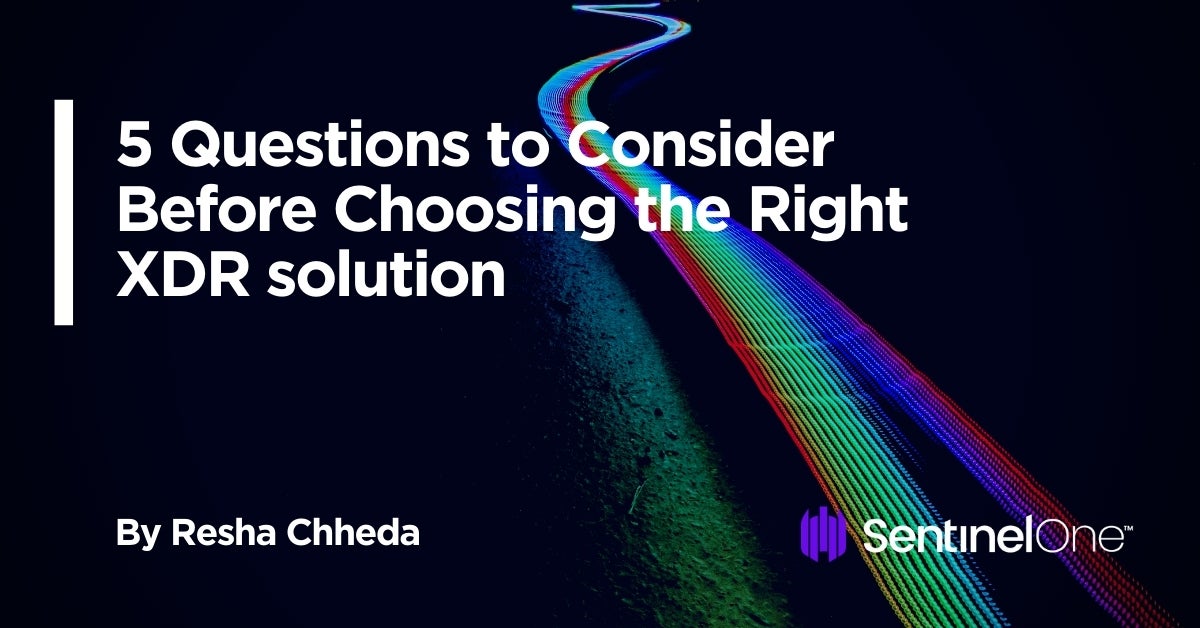The threat landscape continues to evolve and expand rapidly. As attack vectors multiply, from endpoints to networks to the cloud, many enterprises address each vector with a best-in-class solution to protect those specific vulnerabilities. However, these point tools don’t connect the dots across the entire technology stack. As a result, security data is collected and analyzed in isolation, without any context or correlation, creating gaps in what security teams can see and detect.
In addition, as the number of deployed security solutions grows in the enterprise, the capacity to manage them and effectively respond to their alerts also grows. Administrators can quickly become overwhelmed by the entirety of data produced from multiple locations and systems and manage a consistent stream security alert.
Extended Detection and Response (XDR)
XDR, Extended Detection and Response, is the evolution of EDR, Endpoint Detection, and Response. XDR unifies visibility and control across all endpoints, the network, and cloud workloads. This improved visibility provides contextualization of these threats to assist with remediation efforts. XDR automatically collects and correlates data across multiple security vectors, facilitating faster threat detection so that security analysts can respond quickly before the scope of the threat broadens. In short, XDR extends beyond the endpoint to make decisions based on data from more products and can take action across your stack by acting on email, network, identity, and beyond.
As XDR is gaining traction and emerging as a key next-generation security tool, here are five questions you should consider while looking at an XDR solution.

1. Does the XDR Solution Provide Rich, Cross-Stack Visibility With the Ability to Seamlessly Ingest From Multiple Data Sources?
EDR solutions are excellent in obtaining security-relevant information from endpoints. However, they lack telemetry to provide broad visibility for an accurate depiction of an attacker’s behavior and goals that may span other sources. A robust XDR platform solves the telemetric limitation problem by enabling telemetry from multiple security layers and possible attack points. This makes it possible to monitor and manage incoming alerts continuously. Additionally, with the help of threat intelligence feeds, XDR systems can proactively search for concealed threats.
Singularity XDR can enable enterprises to seamlessly ingest structured, unstructured, and semi-structured data in real-time from any technology product or platform, breaking down data silos and eliminating critical blind spots. With our recent Scalyr acquisition, the solution can empower security teams to see data collected by disparate security solutions from all platforms, including endpoints, cloud workloads, network devices, and more, within a single dashboard.
Singularity XDR lets analysts take advantage of insights derived from aggregating event information from multiple different solutions into a single contextualized “incident.” It also provides customers with a central enforcement and analytics layer point hub for complete enterprise visibility and autonomous prevention, detection, and response, helping organizations address cybersecurity challenges from a unified standpoint.
2. Does the XDR Solution Provide Automated Context and Correlation Across the Different Security Layers?
Many EDR solutions require (human) security teams to conduct investigations. But given the volume of alerts generated, many security teams are not resourced to dwell into every single incident. A robust XDR solution should be augmented with AI and automated built-in context and correlation.
SentinelOne patented Storyline technology provides real-time, automated machine-built context and correlation across the enterprise security stack to transform disconnected data into rich stories and lets security analysts understand the full story of what happened in their environment. Storyline automatically links all related events and activities together in a storyline with a unique identifier. This allows security teams to see the full context of what occurred within seconds rather than needing to spend hours, days, or weeks correlating logs and linking events manually.
SentinelOne’s behavioral engine tracks all system activities across your environment, including file/registry changes, service start/stop, inter-process communication, and network activity. It detects techniques and tactics that are indicators of malicious behavior to monitor stealth behavior, effectively identify fileless attacks, lateral movement, and actively executing rootkits. Singularity XDR automatically correlates related activity into unified alerts that provide campaign-level insight and allows enterprises to correlate events across different vectors to facilitate the triage of alerts as a single incident.
3. Does the XDR Solution Auto-Enrich Threats With Integrated Threat Intelligence?
As new threats emerge, a lack of external context makes it difficult for analysts to determine whether an alert or indicator represents a real threat to their organization. Threat intelligence provides up-to-date information on threats, vulnerabilities, and malicious indicators freeing security teams to focus on what is most important. A well-built XDR solution enables threat intelligence integration from multiple sources to help security teams prioritize and triage alerts quickly and efficiently.
Singularity XDR integrates threat intelligence for detection and enrichment from leading 3rd party feeds and our proprietary sources that auto-enrich endpoint incidents with real-time threat intelligence. It empowers security teams to get additional contextual risk scores on indicators of compromise (IoCs) such as IPs, hashes, vulnerabilities, and domains. For example, with our Recorded Future integration, threats are auto enriched from 800,000+ sources, enabling customers to accelerate threat investigation and triage capabilities. Customers can also leverage a query library of hunts curated by SentinelOne research which continually evaluates new methodologies to uncover new IOCs and Tactics, Techniques, and Procedures (TTPs).
4. Does the XDR Solution Automate Response Across Different Domains?
Of course, incident detection and investigation need to trigger an effective response to mitigate the incident. The response needs to be pre-defined and repeatable to make remediation more efficient and intervene at any step in an attack that is in progress. The response should distinctively define both short-term and long-term measures that can be used to neutralize the attack. It is also essential to understand the cause of the threat to improve security and prevent attacks of a similar manner in the future. All necessary steps must be taken to ensure that similar attacks are not likely to happen again.
Singularity XDR enables analysts to take all the required actions to automatically resolve threats with one click, without scripting, on one, several, or all devices across the estate. With one click, the analyst can execute remediation actions such as network quarantine, auto-deploy an agent on a rogue workstation, or automate policy enforcement across cloud environments.
Singularity XDR also lets customers leverage the insights Storyline delivers to create custom automated detection rules specific to their environment with Storyline Active-Response (STAR). STAR allows enterprises to incorporate their business context and customize the EDR solution to their needs. With Storyline Active-Response (STAR) custom detection rules, you can turn queries into automated hunting rules that trigger alerts and responses when rules detect matches. STAR gives you the flexibility to create custom alerts and responses specific to your environment to automatically and rapidly detect and contain threats across your environment.
5. Does the XDR Solution Let You Easily Integrate With Leading SOAR Tools?
As you may have other security tools and technologies deployed in your SOC, your XDR solution should let you utilize your existing investments in security tools. Key features would be built-in integrations, including automated responses, integrated threat intelligence.
SentinelOne offers a growing portfolio of integrations to third-party systems like SIEM and SOAR via Singularity Marketplace. Singularity Apps are hosted on our scalable serverless Function-as-a-Service cloud platform and joined together with API-enabled IT and Security controls with a few clicks. Singularity Marketplace is part of the SentinelOne platform enabling customers to remove the barriers of writing complex code, making automation simple and scalable between vendors. Security teams can easily navigate the best course of action to remediate and defeat high-velocity threats by driving a unified, orchestrated response among security tools in different domains.
Conclusion: XDR is the Future of EDR
The future is an XDR-driven future. Specialized security products must work together to defend against an intensifying effort to overrun the digital barriers that protect our now technology-dependent lives. As with any new technology entering the marketplace, there is a lot of hype, and buyers need to be wise. The reality is, not all XDR solutions are alike. SentinelOne Singularity XDR unifies and extends detection and response capability across multiple security layers, providing security teams with centralized end-to-end enterprise visibility, powerful analytics, automated response across the complete technology stack.
If you would like to learn more about the SentinelOne Singularity Platform, contact us or request a free demo.


